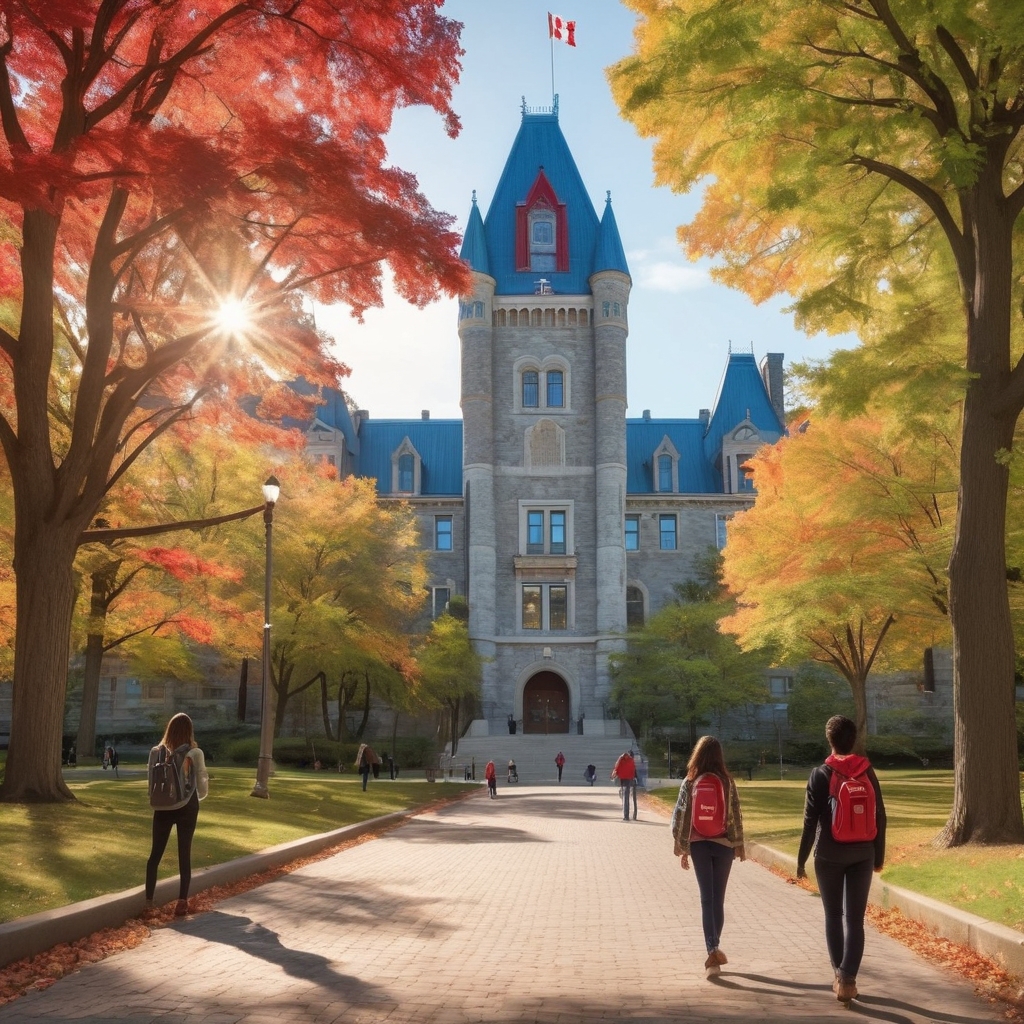McGill University ranks as one of North America’s most selective schools. The university’s acceptance rate shows its status as a top academic choice. Getting in has become tougher each year as admission numbers show a more competitive landscape.
Students from different backgrounds face varying acceptance rates. McGill’s acceptance numbers differ for international students, U.S. applicants, and Canadian students. The school uses specific admission standards for each group. International students typically see lower acceptance rates than their Canadian counterparts. This piece gets into five vital factors that shape your chances of admission at this prestigious Montreal school.

Table of Contents
- 1 McGill’s Competitive Position in Global Education
- 2 Critical Academic Evaluation Criteria
- 3 Financial Factors Affecting Admission
- 4 Program Capacity and Infrastructure
- 5 Market Demand and Employment Prospects
- 6 Here are some FAQs about the McGill University acceptance rate:
- 6.1 Is it hard to get into McGill?
- 6.2 Is McGill the Harvard of Canada?
- 6.3 What GPA do you need to get into McGill?
- 6.4 Is McGill expensive for Americans?
- 6.5 Is McGill an elite university?
- 6.6 Can I go to McGill if I don’t speak French?
- 6.7 Why is McGill so prestigious?
- 6.8 How much does McGill cost for international students?
- 6.9 What is the hardest program to get into McGill?
McGill’s Competitive Position in Global Education
McGill University now ranks 45th in the Times Higher Education (THE) World University Rankings, putting it among the top 2.1% of universities worldwide. This elite status shapes how selective the university can be with its admissions.
World ranking influence on selectivity
Multiple ranking systems highlight McGill’s excellence among elite institutions. The university has managed to keep its spot among the world’s top 50 universities for 15 straight years. Recent rankings show McGill at 29th place out of 1,500 institutions in the QS World University Rankings. The university excels in several areas:
- 13th globally in sustainability
- 24th in employment outcomes
- 54th in employer reputation
- 94th in international research network
Research reputation impact
Research excellence plays a vital role in McGill’s academic standing. The university runs more than 40 research centers in multiple disciplines, which strengthens its competitive edge. Its research evaluation covers analysis of over 157 million citations from 18 million research publications. This extensive body of work establishes McGill’s authority in global academia.
International recognition factors
McGill’s student community showcases its worldwide appeal. Students come from more than 150 countries, with international students making up about 30% of the student body—the highest among Canadian research universities. This global mix adds to McGill’s competitive position and shapes its acceptance patterns.
The university’s global reach goes beyond student diversity. McGill partners with more than 160 universities worldwide for student exchanges. Each year, about 500 exchange students from over 32 countries come to study at McGill. This strong international network helps make McGill’s admission process more selective while boosting its global recognition.
Critical Academic Evaluation Criteria
McGill’s admission process uses a detailed evaluation system that looks at both academic performance and language skills. The university ranks among Canada’s most selective schools. Program acceptance rates range from 20% to 45%.
High school curriculum assessment
Grades from the last three years of high school carry the most weight in McGill’s academic evaluation. Students need to maintain grades between 85% and 95% to compete for most programs. McGill looks at several aspects of U.S. high school students’ academic records:
- Course rigor and challenge level
- Grade progression over time
- Class rank (when available)
- Advanced Placement (AP) results
Extracurricular consideration weight
Academic excellence comes first at McGill, but extracurricular activities also matter in admission decisions. Quality matters more than quantity when it comes to these activities. Students who show leadership skills and take part in community service stand out, though academics still carry more weight.
Language proficiency requirements
McGill sets high language standards because of its location in bilingual Montreal. Students must prove their English skills through one of these tests:
- Duolingo English Test: Score of 125 or better (130 for specific programs)
- IELTS Academic: Band score of 6.5 or better, with individual components no less than 6.0
- TOEFL iBT: Minimum required scores vary by program
Students who have lived and studied in English-speaking countries for at least four years might not need to take these tests. French skills can boost your application’s strength, especially in programs that involve clinical work or community interaction.
McGill takes a comprehensive view of each application. The school looks at both failed and passed courses. This approach helps ensure that admitted students have both academic strength and language skills needed to succeed in McGill’s challenging programs.
Financial Factors Affecting Admission
Financial aspects are vital in shaping McGill University’s admission landscape. The institution maintains a steadfast dedication to financial accessibility. McGill stands out as an attractive option because Quebec offers the lowest tuition rates in Canada.

Tuition considerations by residence status
The university uses a tiered tuition structure that depends on residency status. The rates differ substantially between Quebec residents, out-of-province Canadians, and international students. The Quebec government added $3,000 to the annual tuition for out-of-province students, which brought the total to $12,000. This change aims to boost funding for French universities and might alter admission patterns.
Scholarship availability impact
McGill’s scholarship program shapes admission decisions through several merit-based options:
- One-year Scholarships: $3,000 (non-renewable)
- Major Scholarships: ranging from $3,000 to $12,000 (renewable for up to 3-4 years)
- Prestige Scholarships: $10,000
- Greville Smith Scholarships: $12,000
The university leads all Canadian institutions in the percentage of operating budget allocated to scholarships and bursaries. This support helps maintain competitive acceptance rates and ensures qualified candidates from different financial backgrounds can access education.
Financial aid influence
McGill’s detailed financial aid system makes admission more accessible through several channels. The Entrance Bursary Program helps students from modest-income families. Award amounts depend on demonstrated need and program-specific tuition rates. International students must show financial security for their Quebec Acceptance Certificate. However, they can still access various support options including:
- Work Study opportunities
- Emergency loans
- Tuition fee deferrals
- In-course financial aid
The university’s Work Study program provides great on-campus employment options. International students with valid study permits can start working as soon as they arrive. This program helps students who face financial challenges while they gain professional experience.
McGill takes a strategic approach to financial support that shows its dedication to competitive acceptance rates and accessibility. Montreal’s reputation as an affordable city compared to other major North American locations makes McGill even more attractive to diverse, qualified applicants.
Program Capacity and Infrastructure
McGill University’s selective admission process depends heavily on its physical and human resource capacity. The institution has 1,700 renowned scholars and experts as faculty members, and this infrastructure determines how well they can maintain ideal class sizes and educational quality.
Faculty size limitations
The university keeps a student-to-faculty ratio of 16:1. This helps provide tailored attention while managing enrollment numbers. The ratio has a big effect on acceptance rates because departments need to balance new student numbers with available teaching staff. Most classes have 20 to 30 students, though numbers change based on programs and academic levels.
Research facility constraints
McGill’s research infrastructure includes:
- More than 40 research centers
- Annual research funding of over $700 million (2020-2021)
- Specialized facilities for bioinformatics and intellectual property research
- Advanced laboratory spaces for undergraduate and graduate research
These facilities are extensive but must work within specific program limits. Programs that reach their space limits might need to cancel incomplete applications. This directly affects acceptance rates in specific fields.
Campus resource considerations
Campus infrastructure shapes admission decisions, especially for popular programs. McGill’s dedication to quality education shows in several areas:
- First-year students get guaranteed housing
- Students can use world-class resources and facilities
- Support exists for over 250 student clubs and organizations
- Both campuses offer various study spaces
Growing demand puts pressure on these resources. McGill gives priority to early applicants who submit all their documents. This makes timing just as important as qualifications for getting admitted.
Lab-intensive programs feel this resource strain the most because physical space limits affect how many students they can take. Graduate programs need adequate and safe laboratory and office work spaces. These infrastructure limits are vital in determining acceptance rates for research-focused programs.
Market Demand and Employment Prospects
McGill University’s graduates consistently land positions at leading organizations worldwide, making job prospects the life-blood of its appeal. The university carefully selects students based on their potential career success, which affects its acceptance rates.
Industry partnership influence
McGill’s Office of Innovation and Partnerships helps turn academic research into ground applications. The university builds strong business relationships through specialized research projects and strategic collaborations. Students benefit from these industry connections as businesses increasingly look to McGill for research support and new talent.
The institution’s industry partnerships cover these sectors:
- Financial Services: 36% of employed graduates
- Consulting: 13% of recent placements
- Technology and Manufacturing: Combined 14% of graduate positions
Career outcome statistics
McGill’s employment numbers show strong market demand in programs of all sizes. Students from the Master of Management Analytics (MMA) program have an 82% placement rate within six months of graduation. The Master of Management in Finance (MMF) program achieves an impressive 100% placement rate.
Salary outcomes showcase McGill graduates’ high market value:
| Program | Base Salary (USD) | Industry Range |
|---|---|---|
| MBA | 100,012 (mean) | 60,000 – 219,300 |
| BCom | 60,621 (average) | Varies by sector |
McGill graduates work at prestigious organizations, including:
- Global consulting firms: Boston Consulting Group, Deloitte, McKinsey
- Financial institutions: Goldman Sachs, Morgan Stanley, RBC
- Technology leaders: Microsoft, Google, Amazon
Alumni network impact
McGill’s worldwide alumni network improves graduate employment prospects by a lot. Alumni actively help advance careers through:
- Industry-specific mentorship programs
- Career guidance and professional development
- Exclusive job referrals and recommendations
McGill’s alumni network creates lasting career benefits. Research shows that while only 1% of North Americans attend top-tier universities like McGill, their graduates make up over 10% of Fortune 500 CEOs and a quarter of Senate positions. These numbers highlight the long-term career value of McGill’s selective admission process.
Alumni boost employment outcomes through:
- Hosted networking events and industry conferences
- Exclusive access to job postings and internship opportunities
- Direct connections with industry leaders and decision-makers
McGill’s career services team provides dedicated career coaches and industry experts to help students build professional skills. This complete support system and McGill’s strong market reputation contribute to its competitive acceptance rates and continued appeal among future students.
McGill University stands among North America’s educational elite, which shows in its selective admission process. Its 45th place in global rankings, along with its cutting-edge research and worldwide partnerships, creates an environment where excellence is a must in every discipline.
The evaluation process puts students through their paces. Academic performance, language skills, and financial requirements all play crucial roles. McGill offers some of Canada’s most competitive tuition rates, especially for Quebec residents. But recent policy shifts for out-of-province students show how admission factors keep evolving.
Space limitations and faculty size requirements make the selection process even more competitive. The university maintains a 16:1 student-to-faculty ratio to ensure quality education. This selective approach pays off – McGill graduates land positions at top global organizations. They tap into a powerful alumni network that reaches into Fortune 500 companies and government leadership.
McGill’s acceptance rate means more than just academic screening. It reflects the university’s steadfast dedication to academic excellence and its goal to prepare graduates for success in today’s competitive global job market.
Here are some FAQs about the McGill University acceptance rate:
Is it hard to get into McGill?
Yes, McGill is considered a competitive university to get into, with an overall McGill University acceptance rate of around 46%. However, the McGill acceptance rate for international students and McGill acceptance rate for US students can vary depending on the program and academic credentials. Strong grades and test scores are essential for admission.
Is McGill the Harvard of Canada?
McGill is often referred to as the “Harvard of Canada” due to its reputation for academic excellence and global prestige. With a relatively low McGill acceptance rate, it attracts top students from around the world and is ranked as one of Canada’s top universities.
What GPA do you need to get into McGill?
The GPA requirements for McGill vary by program, but competitive applicants typically have a GPA of 3.7 or higher on a 4.0 scale. International students, including those applying under the McGill University acceptance rate international students, should aim for excellent academic performance to strengthen their chances.
Is McGill expensive for Americans?
McGill is more affordable compared to many U.S. universities, even for international students. Tuition for Americans and other international applicants depends on the program, but financial aid and scholarships may offset costs. Despite the competitive McGill acceptance rate for US students, many find its cost reasonable for a world-class education.
Is McGill an elite university?
Yes, McGill is one of Canada’s most elite universities and is internationally recognized for its academic programs and research. Its selective McGill University acceptance rate reflects its high standards, attracting exceptional students globally.
Can I go to McGill if I don’t speak French?
Yes, you can attend McGill without knowing French. While the university is located in Montreal, a bilingual city, McGill itself operates primarily in English. Students applying through the McGill acceptance rate for international students do not need to meet French language requirements.
Why is McGill so prestigious?
McGill’s prestige comes from its long history, high academic standards, and contributions to research and innovation. Its selective McGill acceptance rate and a strong international reputation further solidify its position as a top university in Canada and globally.
How much does McGill cost for international students?
The cost of attending McGill for international students varies by program. Tuition fees can range from CAD 18,000 to CAD 50,000 annually, depending on the faculty. Many international students apply through the McGill University acceptance rate international students and take advantage of scholarships or financial aid to reduce expenses.
What is the hardest program to get into McGill?
The hardest programs to get into at McGill are typically those in medicine, law, and engineering. These programs have a much lower McGill University acceptance rate compared to other faculties and require exceptional academic credentials and extracurricular achievements.


